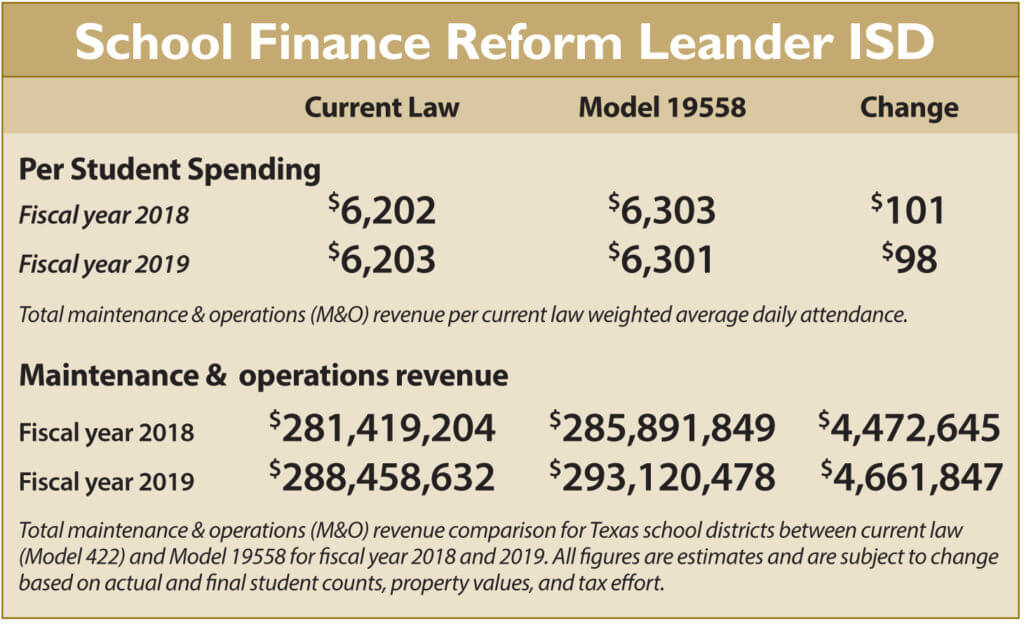Leander ISD has registered support for state House Bill 21, a school finance reform bill, which if passed would add a total of $6.5 million to district coffers in the next two fiscal years, said Terry Abbott, LISD chief communications officer.
Abbott attended a March 14 legislative hearing on the bill. “The bill takes a strong step toward creating a better school finance system in Texas and would increase our funding for the education of students,” he said.
Specifically, LISD would see an increase of $4.3 million in the first year and a $2.2 million increase in the second year.
House public education committee chairman, Rep. Dan Huberty (R-Kingwood), authored HB 21, which would provide more than 95 percent of Texas school districts additional per-student funding compared to what they are scheduled to receive under current law, Abbott said.
Financing is already in the Senate appropriations bill, which is now on the governor’s desk, said Molly Spratt, Huberty’s legislative director.
Increase per student funding
A central provision of HB 21 is an increase in the basic allotment, the amount of state funding given to school districts per student.
The allotment increase would vary depending on a district’s funding formula. LISD would receive about $100 in additional funding per student, per year for two years, said school board member, Pam Waggoner.
“It’s more funding and that’s good. I’m all for HB 21,” said Waggoner.
LISD now receives about $6,200 per student in state funding, according to a model published by the state Public Education Committee.
With an enrollment of about 38,260, the district expends $8,258 per student in state and local money from its operating budget of $321.3 million.
Transportation funding
Among the details of HB 21 is that the increase per student includes monies in what the state calls transportation funding; however, because it would flow through the basic allotment there would be no restrictions on use, said Spratt.
It has been more than 30 years since the state updated its transportation funding formula. “It was determined using a method based on mileage/buses/children, etc. HB 21 changes that to a flat rate per student,” noted Spratt.
Abbott said, “The transportation allotment from 1984 has been a funding source for a fraction of the transportation costs for probably all school districts. I would venture to guess that no district has received transportation monies in excess of their related costs.”
LISD now receives $2.6 million in transportation funding, he said.
Dyslexia funding
Another provision of HB 21 is weighted funding for dyslexia students. “The actual amount we receive will be determined in the fall, but currently, the additional funding for this student population is included as part of the $4.3 million of new money in 2017-18,” said Abbott.
Recapture funding
HB 21 also calls for a reduction in “recapture” funding and a two-year hardship grant program to help districts affected by the expiration of the Additional State Aid for Tax Reduction.
“Recapture is when so-called ‘property rich’ districts must send money back to the state – recapture funds – to help fund so-called ‘property poor’ districts,” Abbott said.
LISD does not pay into recapture nor does the ASATR grant apply to the district, Abbott said.
Looking ahead
If HB 21 is approved, how the district would adjust spending to account for the funding increase is yet to be determined, Abbott said.
It could help improve LISD education in several ways. “The $6.5 million in additional funds could help to cover inflationary increases in the budget, including such things as academic programs and teacher salaries,” Abbott said.
“It’s an opportunity to enhance improvement of student progress or lower teacher/student ratios in the classroom,” he added.
Abbott encourages the community to contact legislators and speak in support of HB 21. A copy of the bill is available at www.capitol.state.tx.us/BillLookup/BillNumber.aspx



